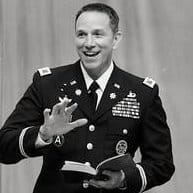
If I were to ask you right now to write down some words that describe a leader, you’d probably identify qualities like purposeful, committed, compassionate, confident, goal setter, determined, and vision caster.
Another word that often gets put in the mix is “driven.”
A driven leader is one who is able to push through adversity, to get knocked down in the arena of life yet still able to stand up, dust off, and get back into the fight. However, “driven” can be negative, too. “Driven” can describe the task master boss we all hate to work for and never want to be. It connotes an unhealthy sense of success orientation, a “get things done at all costs” attitude that can tear apart an organization and the leader driving it.
When Jesus tells us in the Sermon on the Mount that we are called to be salt that adds flavor to a sometimes flavorless world and light that shines on this world’s darkness, he speaks of the influence we are to have in this world.
It’s not just a calling for those in ministry. It’s a calling for all of us to influence this world in his name.
If we are called to influence the world around us, then we should all exercise some form of leadership. But what happens when we become so driven to live out our God-given calling that we lose sight of what’s truly important? Our priorities suffer, our health wanes, and our relationships feel the pain of this thing I call “driven-ness.”
I don’t think I’m alone when I confess that I’m guilty of mixing up my priorities as I wrestle with the leadership mantle God gave me. In over thirty years of leading people and organizations, I’ve noticed that there’s a fine line between passionately living out our calling in a healthy manner and living it out in a way that causes harm. The unhealthy trait of driven-ness leads to burnout, something so many leaders have gone through, are going through, and will go through.
I’m one of those leaders.
Whether you’re a ministry leader or a leader in the secular arena, have you ever gotten to that point where you have no gas left in your tank? That point in which the thought of even taking one more step forward makes you want to just sit and cry? You see that bus coming by as you’re walking on a busy city street and instead of getting on the bus you want to throw yourself under it. That point in your life where you are one tragedy away from losing your joy and a day away from giving up on your God-given calling.
If the answer to that is a resounding “yes” then you are not alone. You need help, and your driven-ness may be to blame.
We all want to be good, godly leaders. None of us wake up in the morning and say, “Man, I hope I mess things up today.” As godly leaders we desire to do all things for God, being a bond servant of his rather than a pleaser of people (Galatians 1:10).
However, in our desires to do our best as leaders for God we can develop an unhealthy driven-ness. On a couple of really bad days that I’d like to share with you, that driven-ness broke me.
God calls us to be passionate about living out our divine purpose—that place where our deepest passions, greatest talent and God’s spiritual gifting all come together for his good and perfect will. But there’s a difference between living out our divine purpose with passion and living it out in an unhealthy, driven manner. Our passion for our work needs boundaries, so that we maintain effectiveness in his kingdom over the long haul.
We must guard ourselves against “driven-ness.”
Let me give you two snapshots of what I experienced, one as a senior military officer in the Army, the other as a pastor who hit the wall. My hope is that if you answered “yes” to the question I posed that you will be able to realign yourself so that you can be effective in your leadership calling.
Go back in time with me only seven years—a time in which I was not a pastor in the civilian world but a colonel in the U.S. Army.
It was a really bad day.
I had just been told that the President of the United States was going to make a visit within a handful of weeks to Seoul, South Korea—the place I was assigned as the defense attaché at the American embassy.
Don’t get me wrong, it’s great to have the president swing by for a visit. But when you’re in the job I had at that time, a presidential visit adds a whole new level of difficulty to an already busy mission.
The organization I led was focused on things that were going on in the region, specifically North Korea. That country’s leader, Kim Jong-il, was doing his best to derail any possibilities of peace in Asia by developing a nuclear program. We also had our share of problems we were working through with our key ally, the Republic of Korea. Our two militaries were shifting command responsibilities on the peninsula, giving more responsibility to the South Korean military leaders so they could defend their country. Add several issues with China and a few key visits from other senior officials from the United States (most of whom I would have to meet, brief on the current situation, and spend “quality” time with) and you can probably see that my cup was ready to spill over the top.
Oh yeah, and I forgot to mention that I was going to seminary, preparing to go into ministry upon completion of my tour, and trying to be a godly husband to my wife and a good father to my three teenagers.
The presidential visit was the straw that broke the camel’s back.
Too many years of being driven. Too many late nights at work. Too many years without boundaries.
On that really bad day I saw the city bus drive by and I wanted to throw myself underneath it. I was tired. Long hours, high stress, and limited time feeding my soul with God’s Word over the past twenty-five years of service had taken their toll on me.
What’s strange is that I was simply too tired to jump in front of that bus. Not that I wanted to kill myself, but the thought of rest seemed like a far-fetched dream.
All of the words describing good leaders that I listed above had been ascribed to me by my superiors and subordinates. One in particular, though, was the source of my pain: “driven.” I have always struggled with pushing myself too hard. It’s actually a double-edged sword. I’m a leader who has a track record of getting results without killing the people who work for me. But the purposefulness of mission can lead me to become so driven that I focus on the results rather than the journey to the results. What’s more, I can lose sight of the “why” because I’m so focused on the outcome.
There seems to be a tension I experience between two of my favorite Bible verses, Luke 12:48 and Luke 16:11. In Luke 12:48, Jesus says, “From everyone who has been given much, much will be required; and to whom they entrusted much, of him they will ask all the more.” Whether I’m living out my role as a senior leader in the military, a pastor, or a husband and father, God has entrusted me with much.
I take his confidence in me seriously, which causes me to overproduce and go to extremes—to be driven.
Jesus’ words in Luke 16:12 add to the tension when he says, “And if you have not been faithful in the use of that which is another’s who will give you that which is your own?”
I take the gifts God has given me seriously, which causes me to overproduce and go to extremes—to be driven.
And here’s a truth all leaders must face: Driven-ness robs us of our joy and derails any concept of godly peace in our lives.
H.G. Wells once discussed his struggle to find peace in his life: “The time has come for me to reorganize my life, my peace – I cry out. I cannot adjust my life to secure any fruitful peace. Here I am at sixty-four, still seeking peace. It is a hopeless dream.”
Let me assure you, peace is not a hopeless dream. God’s got a lot to say about that.
One of my biblical heroes is the apostle, Paul. Paul spent some time struggling with his flesh and that thing called “driven-ness.” After a Jesus-in-your-face conversion on the road to Damascus (see Acts 9), Paul realized that his zealousness in persecuting the church was just as out of sorts as the self-righteousness he found in living out the letter of the Mosaic Law (Philippians 3:3-6). In time, Paul went from being a driven man to being a passionate man.
There’s a big difference between the two.
A driven man is convicted that God wants him to do something. The results of that something rests in the lap of the driven man. His focus is on his accomplishments as he does all he can with all he has to honor God.
However, his focus is misplaced. It’s based on a narrow principle, such as numbers of people reached, tasks accomplished, money earned, toys accumulated, or other statistics found in success metrics. He is results-oriented, and because of that he loses the ability to let the Holy Spirit guide him.
Driven-ness leads to an unhealthy pursuit of idols, some of which may be disguised in godly things. My fellow pastors may need to read that two or three more times. The shoe has fit me in my life, hopefully it doesn’t fit you. Driven-ness leads to pride and those “thorns and snares” that can trip up a person (Proverbs 22:5).
When I look back to that very bad day in Seoul, South Korea, I see that I was suffering from burnout, caused by that unhealthy sense of driven-ness that accumulated over the course of more than two decades of high visibility/high chance of failure positions. My life verse at that season of my life in Seoul was 1 Corinthians 9:24: “Do you not know that in a race all the runners run, but only one gets the prize? Run in such a way as to get the prize.” Those great words penned by Paul spurred me on to work harder and to never give up—but I was relying on my strength, not God’s.
I had a history of success in the military. I had enlisted in the Army when I was 17 years old and for 28 years rose quickly through the ranks, culminating with that assignment at the U.S. Embassy in Seoul, South Korea. During those 28 years I had seen God work in my life in unimaginable ways. He brought me the love of my life, my wife Linda. He provided me three incredible kids. He took me around the world, got me in and out of combat safely, and gave me experiences in hardship that were life lessons in leadership. He put me in positions with a high chance of failure, showing me that he was a sovereign God who would use any available and obedient servant who had the faith to simply say “yes.”
You know there’s a “but” to this.
I had a history of driven-ness. For decades the Army had taught me to drive through difficulty. When I was in a special forces unit one of the men I commanded told me, “Sir, you gotta lean into the pain and terrain when things get tough.” In other words, when you’re climbing that steep, difficult mountain you have to ignore the pain and lean into the mountain so you don’t fall.
On that really bad day in Seoul, South Korea, I leaned into the pain and terrain. When I was walking home that night I wanted to throw myself under the bus. I was tired. I was depressed. I couldn’t see the end in sight. My driven-ness had led me to the point of a breakdown. I had passion for the purpose I felt God had given me, but it was a passion without boundaries. In my driven-ness I had become the opposite of what God wanted me to be—a passionate man.
The passionate man cannot be defined by narrow principles like success metrics—the amount of money earned, people reached, toys accumulated, size of business, organization, ministry, or church. He is driven, but that driven-ness has boundaries. His passion is a God-given divine purpose, propelling him forward through a relationship with a divine being.
A passionate man walks in step with the Holy Spirit, allowing the Holy Spirit to determine when he should press on or pull back. Because he is in a relationship with God, he listens to the Holy Spirit so he can ebb and flow in rhythm with God. He does things in God’s strength, not his own.
The passionate man knows when to say “no” to something good so he can have the energy, time, and sensory acuity to say “yes” to something better. At the end of the day the driven man thinks that God wants him to do something. The passionate man knows that God is doing something and that they are doing it together, with God in the lead.
The passionate man accomplishes things through God and his strength rather than for God in his own strength.
* * *
Pastor Kip continues his story with “The Driven Leader, Part 2.”
Have you experienced burnout like Kip? Do you have other thoughts on “driven-ness”? Share with us in the comments!





